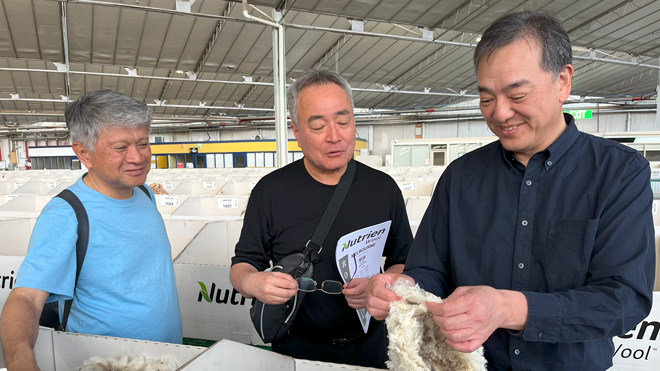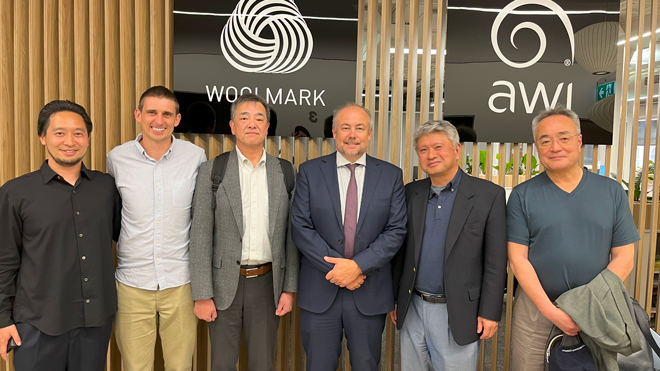Japanese Nikke backs Aussie wool supply

High profile decision makers from Japan’s largest wool spinner and fabric manufacturer Nikke visited Australia in March to research a stable supply of wool from Australia and explore ways to revitalise the global wool industry.
Established in 1896 at the dawn of the wool textile industry in Japan when western style clothing was starting to become popular, Nikke has defined the history and evolution of Japanese wool textiles for 128 years, and continues to produce high-quality products.
The company consumes 2,300 tons of Australian Merino wool each year to manufacture yarns and fabrics for use in a full range of products including menswear, womenswear, childrenswear, plus school, corporate and police uniforms. Nikke’s clients include apparel brands, retailers, fabric wholesalers and designers. It has annual sales worth more than A$1.1 billion.
Nikke visit to Australia

AWI Product, Education Extension & Trade Licensing Manager, Japan, Tomohiro Nishizawa; AWI Program Manager, Woolmark Certification & Traceability, Mark Scott; Nikke President and CEO Mr Yutaka Nagaoka; AWI CEO John Roberts; Nikke Director, Managing Executive Officer, Apparel & Textile Division, Mr Yoshiyasu Kaneda; Nikke Executive Officer, Manufacturing Department, Apparel & Textile Division, Mr Akira Okada.
The top three decision makers of the Nikke Clothing & Textile division visited Australia in March to research the scoured wool supply chain in Australia.
Hosted by AWI, the Nikke delegation visited three scouring facilities: Michell Wool in Adelaide, E.P. Robinson in Geelong and Victoria Wool Processors in Melbourne to examine their scouring capacities and the potential for simplifying its supply chain.
Nikke President and CEO, Mr Yutaka Nagaoka, says Australian wool is indispensable for the global wool industry.
“Australia is vital to ensure a stable supply of wool to the world. Although wool production has been stable over the past few years, there was a period when the number of sheep decreased dramatically which was a cause for concern,” Mr Nagaoka said.
"At Nikke, we want to not only see a stable supply of Australian greasy wool, but also see a buoyant early stage processing industry in Australia that comprises scouring and carbonising. Stable procurement is very important for us.
“We believe that protecting the early stage processing industry in Australia will avoid geopolitical risks."
“We ask for Australia to provide a stable supply of both greasy wool and early processed wool.”
- Mr Yutaka Nagaoka, Nikke President and CEO
Nikke was one of the first companies in the world, and the first ever Japanese company, to become a Woolmark licensee when the Woolmark licensing program was founded in 1964.
Continuing its long-standing relationship with the Woolmark brand, Nikke works with AWI and its subsidiary The Woolmark Company to co-develop fabric innovations and promote wool – see opposite page for an example.
“The Woolmark Company has introduced us to several notable brands for business development and has also helped us to develop new product innovations and applications,” Mr Nagaoka said.
Global expansion
Mr Nagaoka says that although wool consumption in Japan faces the challenge of a declining population, the global outlook is promising.
“We will strengthen our efforts to focus not only on Japan but also on the world. In Japan, wool consumption has declined due in part to a decrease in population since 2010. However, on a global scale, the population is increasing, and we believe that the textile industry is a growth industry. We are therefore moving forward with initiatives aimed at maximising overseas growth,” Mr Nagaoka said.
“Wool is a natural fibre and has the potential to capitalise on the global trend towards sustainability.
“As well as continuing to defend our traditional markets such as school and business uniforms, we are currently focussed on expanding our knitted products.”
More information: www.nikke.co.jp
This article appeared in the June 2024 edition of AWI’s Beyond the Bale magazine. Reproduction of the article is encouraged.












